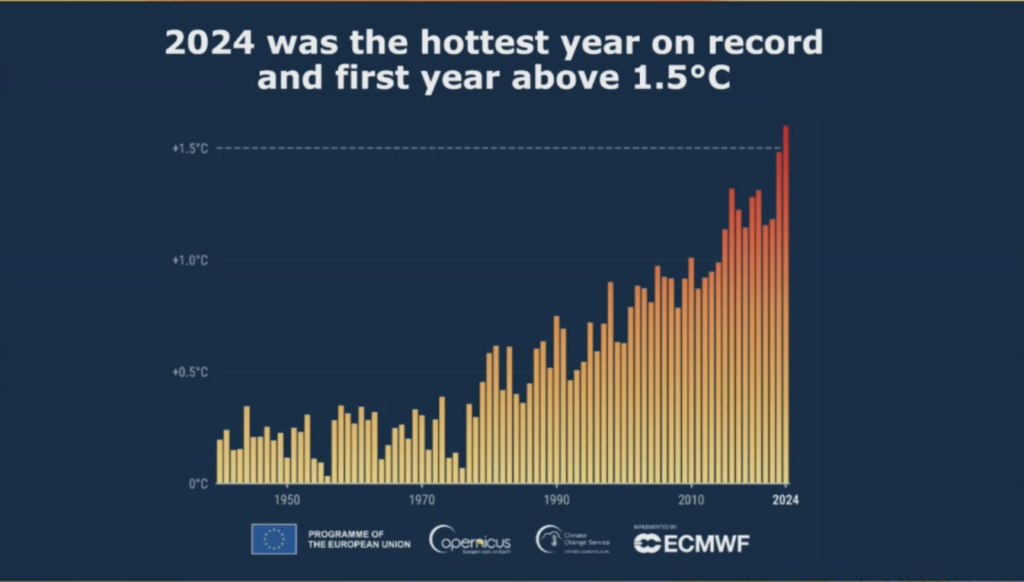2024 Declared Hottest Year On Record and Travel Emissions Set to Rise

Skift Take
Our world was hotter in 2024 than any other year on record, the United Nations, the European Commission, and NASA said on Friday.
Greenhouse gas levels in the atmosphere rose to record levels, and the average global temperature exceeded 1.5 degrees celsius above pre-industrial levels for the first time – that was the level agreed to almost decade to as part of a landmark climate agreement in Paris.
Despite many efforts and pledges from within travel and tourism, UN Tourism projects that the emissions from this sector will rise 25% by 2030.
There are a variety of figures as to how much the travel and tourism industry emits. A recent study and the World Travel and Tourism Council puts the industry’s impact at 8-9% of annual global emissions.

“One can only feel sad, but at the same it has to spur us into action,” says Inge Huijbrechts, global senior vice president of sustainability at the Radisson Hotel Group.
The group has over 1,500 hotels in over 90 countries and is one of almost 900 businesses and organisations that signed a UN tourism led agreement in 2021, the Glasgow Declaration, to reduce emissions in the tourism sector.
Radisson has committed to reduce greenhouse gas emissions by almost half by 2030.
“The size of this challenge and the size of the reductions we need to do by 2030 is a real transformation,” Huijbrechts said.
There is progress, Huijbrechts said. Around 80 of the company’s hotels are now running on 100% renewable energy and the emission intensity across the businesses has decreased since 2019.

Huijbrechts said many hotel owners operate their businesses under the Radisson name. Therefore, one of the biggest challenges is getting owners onboard with the group’s climate goals.
“The owners are really key in this whole development. So we work with them and we try to work with them at a very early stage,” she said.
On top of that, each country Radisson operates in has its own regulations and laws about emissions, renewable energy access and other climate related matters.
Why Are Emissions Rising Despite Pledges to Cut Emissions?
For those who signed the Glasgow declaration there are no real consequences for not taking action. However, UN Tourism expects annual reports on progress from businesses that signed up.
“We missed the first submission and they were chasing us,” said Paul Easto, chief sustainability officer at the Active Travel Group, a UK based operator of outdoor tours.
“They are ensuring people are making bold commitments. It gets people in the room. A lot of time has been spent on goal setting and measurements. Now is the time for action,” he said.
The company aims to reduce emissions by 90% by 2030.
Part of the plan involved a move to electric vehicles and to provide guests with meals with a lower carbon footprint.
The biggest challenge, Easto said, is trying to encourage partners such as hotels to also set ambitious climate goals.
“I’m trying to encourage those businesses we work with to make the steps that they need in order to reduce the carbon footprint of the accommodations that they’re operating because that’s beyond our immediate control. Yet it’s such an important part of the experiences that we provide,” he said.
In the past, Action Travel Group used carbon credits to try and offset emissions.
However, carbon offsetting has become controversial because of self-regulation and a lack of transparency in how they are created. Some carbon credit firms have been accused of over estimating how many emissions are saved.
“We stopped doing it because of issues around the robustness and credibility of the carbon credits that are out there,” Easto said. “We are spending our time now looking at emission removal technology and projects.”
UN Tourism said in a report that “it is also increasingly evident that offsetting is a temporary mechanism and focus should shift to real greenhouse gas emission reductions.”
Many businesses, such as airlines, give customers the option to offset emissions.
Radisson offers customers the chance to offset their stay by using their hotel reward points to offset emissions.
When asked if this instead puts the onus on customers to take responsibility for emissions, Hujibrechts said the group aims to make it easy to stay sustainable.
“We always want to make it easy for guests,” Huijbrechts said, adding that the company uses verified carbon credits and offers transparency to consumers on the origin of carbon offsets.
Travel Is ‘Vulnerable’ From Impacts of Climate Change
UN Tourism warned businesses in travel and tourism that the industry is “highly vulnerable” to the impacts of climate change.
“In 2024, extreme weather events were observed worldwide, ranging from severe storms and floods to heatwaves, droughts and wildfires. The increasing frequency and intensity of such events pose a significant risk to the livelihoods of people across the globe,” the EU climate body said.
In a press conference on Thursday, Carlo Bountempo, director of the European Commission’s Copernicus Climate Change Service, referring to record numbers of extreme heat days in 2024, said that “the many record breaking events over the last 12 months are not statistically oddities but rather a consequence of the warming of our atmosphere.”
“The underlying physics is very clear, a warmer climate produces more extreme events such as heatwaves, heavy rainfall, destructive storms. Adaptation is no longer an option but a necessity. Early warning systems in order to try and save lives is needed,”
Many countries and businesses are recognizing the threat of extreme weather events and trying to prepare for it.
A Spanish government report has warned that climate change could significantly impact the country’s tourism industry, leading to eroded beaches, flooded transportation systems, water shortages during peak seasons, and the closure of ski resorts.
The report also projected that, by 2080, tourism in northern Europe could decline by 20% compared to 2004 levels, as rising temperatures prompt more people to holiday closer to home.
Government Policy and Regulations
For Easto, government policy is not moving ahead fast enough.
“Government changes we’d like to see that would address emission challenges have to come from regulation ultimately,” he said.
“Domestic air travel for example, we have a situation if I have a meeting in London, travel by train takes longer but it is typically four to five times the price than getting on a plane. This is down to investment and taxation and public transportation. Doesn’t help us make the right choices as consumers.”
The WMO and EU Commission scientists presented some hope. While the world is already dealing with the impacts of climate change right now, scientists estimate that global greenhouse gas emissions from human activity decreased in 2024 by 5%.
Despite the expected emission rise and the challenges, many businesses in the travel industry continue to work to try to take action and come up with solutions.
Huijbrechts from Radisson said sector wide agreements such as the Glasgow declaration bring focus and direction.
At the annual global climate talks in Azerbaijan last year, COP29, a themed day on tourism was included for the first time with support from UN Tourism, which saw governments and businesses discuss progress and sign new deals on emission reduction action.
“Often tourism and travel is a bit of a forgotten industry because it’s a puzzle of lots of things and a lot of players. But the urgency is good because it drives action. It brings us together,” she said.
Skift’s in-depth reporting on climate issues is made possible through the financial support of Intrepid Travel. This backing allows Skift to bring you high-quality journalism on one of the most important topics facing our planet today. Intrepid is not involved in any decisions made by Skift’s editorial team.




